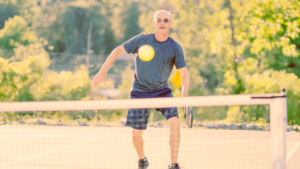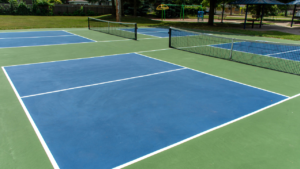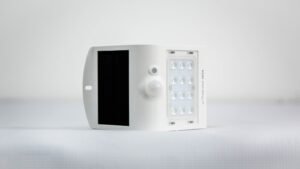
Ah, pickleball – the sport that’s taken the world by storm! But did you know that mastering the game goes beyond perfecting your dink shot? In fact, according to a recent USA Pickleball survey, 92% of players believe good pickleball etiquette is just as important as skill on the court. That’s right, folks – being a pickleball pro isn’t just about your paddle prowess!
Whether you’re a seasoned player or just starting out, understanding pickleball etiquette is crucial for enjoying the game and fostering a positive community. Trust me, I’ve seen my fair share of court conflicts that could’ve been avoided with a little know-how. That’s why we’re diving into the unwritten rules of pickleball etiquette. These seven golden guidelines will not only make you a better player but also a crowd favorite!
So, grab your paddle and let’s serve up some serious etiquette knowledge. By the time we’re done, you’ll be the politest player on the court – and probably the most popular one too!
Table of Contents
Pickleball Etiquette Rule #1:
The Golden Rule of Pickleball: Respect the Kitchen

If there’s one area of the pickleball court that deserves your utmost respect, it’s the kitchen. No, I’m not talking about whipping up a post-game snack – I’m referring to the non-volley zone, affectionately known as “the kitchen” in pickleball lingo.
Understanding the kitchen rules is crucial for both fair play and safety. Here’s the deal: you can’t step into the kitchen to volley the ball. It’s as simple as that. But trust me, in the heat of the game, it’s easier said than done!
Why is stepping into the kitchen such a big no-no? Well, it prevents players from dominating the game by camping out at the net. Plus, it keeps things safer by reducing the chance of high-speed volleys at close range. Nobody wants a pickleball to the face, right?
So, how do you gracefully handle kitchen violations? First and foremost, be honest. If you realize you’ve stepped into the kitchen during a volley, call the fault on yourself. Your opponents will appreciate your integrity, and you’ll be setting a great example of pickleball sportsmanship.
Remember, accidents happen. If you see an opponent step into the kitchen, politely point it out. No need for dramatic accusations or heated debates – a simple, “I think you might have been in the kitchen on that one” usually does the trick.
By respecting the kitchen, you’re not just following the rules – you’re showing respect for the game and your fellow players. And that, my friends, is the essence of good pickleball etiquette!
Pickleball Etiquette Rule #2:
Calling the Score: Speak Up and Be Clear

Picture this: you’re in the middle of an intense rally, the ball is flying back and forth, and suddenly you realize… wait, what’s the score again? We’ve all been there, and it’s not a great feeling. That’s why clear score-calling is a crucial part of pickleball etiquette.
The importance of announcing the score before each serve cannot be overstated. It keeps everyone on the same page, prevents disputes, and maintains the flow of the game. Plus, it’s just plain courteous!
So, how do you properly announce the score? It’s simple, but there’s a specific order to follow:
- Server’s score
- Receiver’s score
- Server number (1 or 2)
For example, you might call out “4-3-2”, meaning the serving team has 4 points, the receiving team has 3 points, and it’s the second server’s turn.
Pro tip: Use a loud, clear voice when calling the score. Your opponents will thank you, especially if you’re playing outdoors where wind can carry your words away faster than a well-placed lob shot!
But what happens if there’s a score dispute? Stay calm, my pickleball friends. Here’s how to handle it like a pro:
- Stop play immediately
- Discuss the last agreed-upon score
- If you can’t reach an agreement, replay the last point
Remember, it’s just a game (albeit an awesome one). A little patience and understanding go a long way in resolving score disputes.
By mastering the art of score-calling, you’re not just following pickleball etiquette – you’re contributing to a smoother, more enjoyable game for everyone. And who knows? Your clear communication skills might just give you the edge in your next tournament!
Pickleball Etiquette Rule #3:
Ball Retrieval: To Fetch or Not to Fetch?

When a stray ball rolls onto your court, should you fetch it or leave it be? It’s not quite as profound as “to be or not to be,” but in the world of pickleball, it’s pretty darn important!
Let’s start with the golden rule of ball retrieval: safety first! If a ball from another court rolls into your playing area during a point, yell “Ball on court!” and stop play immediately. Nobody wants to trip over a rogue pickleball mid-rally!
Now, when it’s appropriate to retrieve balls from other courts:
- Between points
- During natural breaks in play
- When it’s safe to do so without disrupting nearby games
But here’s the catch – don’t go chasing after every ball that comes your way like an overexcited puppy. Sometimes, it’s best to let the other players retrieve their own balls. Use your judgment!
When you need to ask for your ball back, politeness is key. A simple “Ball, please!” with a smile goes a long way. And if you’re on the receiving end of that request, be a good sport and return the ball promptly. Maybe even show off your underhand toss skills while you’re at it!
Here’s a pro tip for returning balls to neighboring games: use the “roll and bounce” technique. Give the ball a gentle roll towards the other court, then let it bounce once before they catch it. It’s easier for them to grab, and you’ll look like a pickleball pro!
Remember, good ball retrieval etiquette is all about being aware of your surroundings and considerate of other players. It’s these little acts of courtesy that make the pickleball community so fantastic!
Pickleball Etiquette Rule #4:
Court Awareness: Mind Your Surroundings

It’s time to channel your inner owl and develop some 360-degree awareness! Being mindful of your surroundings on the pickleball court isn’t just good etiquette – it’s essential for everyone’s safety and enjoyment.
First things first: how to avoid disrupting nearby games. Picture this: you’re in the zone, about to unleash your killer serve, when suddenly – WHAM! – a player from the next court backs into you. Talk about a mood killer, right? To prevent these court collisions:
- Stay within your court boundaries
- Keep an eye (and ear) out for players on adjacent courts
- If you must leave your court, wait for a break in play
Now, let’s talk about the art of court crossing. We’ve all been there – your ball has gone rogue and rolled onto another court. Before you go charging after it like a bull in a china shop, remember this golden rule: wait for a break in play before crossing courts. A polite “May I?” goes a long way in these situations.
Here are some tips for maintaining a safe playing environment:
- Be aware of your paddle’s swing radius
- Watch where you’re stepping, especially when moving backwards
- If you see a hazard (like a loose ball), alert other players immediately
Oh, and here’s a quirky tip from yours truly: develop a “pickleball radar.” No, I’m not talking about some high-tech gadget. I mean tuning your senses to the sights and sounds around you. That way, you’ll be able to anticipate potential court conflicts before they happen. It’s like having a superpower, but for pickleball!
Remember, good court awareness isn’t just about avoiding collisions – it’s about creating a harmonious playing environment for everyone. By being mindful of your surroundings, you’re showing respect for your fellow players and the game itself.
Pickleball Etiquette Rule #5:
Sportsmanship: Grace in Victory and Defeat

Whether you’re crushing it on the court or having an off day, there’s one thing that should remain constant: your sportsmanship. After all, pickleball isn’t just about who can hit the best dink – it’s about building a community and having fun!
Let’s start with the post-game ritual: the handshake or paddle tap. This isn’t just some outdated formality – it’s a show of respect and camaraderie. Win or lose, always approach the net with a smile and a sincere “good game.” And in these post-pandemic times, if you’re not comfortable with handshakes, a friendly paddle tap works just as well. Remember, it’s not just what you do, but how you do it that counts!
Now, let’s tackle the thorny issue of disputed calls. We’ve all been there – you’re sure the ball was out, but your opponent swears it was in. Here’s how to handle it with grace:
- Take a deep breath. Count to three if you need to!
- Calmly explain what you saw.
- Listen to your opponent’s perspective.
- If you can’t agree, offer to replay the point.
Remember, in recreational play, it’s better to give your opponent the benefit of the doubt than to start a heated argument. Save the intensity for your serves, not your disputes!
Here’s a pro tip: if you find yourself getting frustrated, try using humor to defuse the situation. A lighthearted joke can work wonders in tense moments. Just keep it friendly and avoid sarcasm – we want to break the tension, not create more!
Lastly, don’t forget about encouraging and supporting your partner and opponents. A well-timed “Nice shot!” or “Great rally!” can boost morale and create a positive atmosphere on the court. And hey, if your partner is having a rough game, be their cheerleader. We all have off days, and a supportive partner can make all the difference.
At the end of the day, remember this: in pickleball, as in life, it’s not just about whether you win or lose – it’s about how you play the game. Show grace in victory and defeat, and you’ll not only be a better player but also a beloved member of the pickleball community.
Pickleball Etiquette Rule #6:
Noise Control: Keep It Down on the Court

It’s time to talk about something that can really rattle some cages – noise on the court. Now, don’t get me wrong, I love a good celebratory “Woo-hoo!” as much as the next player, but there’s a time and a place for everything.
First things first: when is it okay to celebrate? Here’s a quick guide:
- After winning a particularly challenging point
- When you or your partner make an impressive shot
- At the end of a game or match
But remember, keep it brief and respectful. Nobody likes a gloating Gary or a shrieking Sheila on the court!
Now, what about those noisy neighbors? You know the type – the ones who seem to think they’re at a rock concert instead of a pickleball game. If you find yourself next to a rowdy group, here’s how to handle it politely:
- Wait for a break in play
- Approach them with a friendly smile
- Politely explain that the noise is affecting your game
- Suggest a compromise, like celebrating a bit more quietly
Remember, most people don’t realize they’re being disruptive. A kind word usually does the trick!
Here’s a fun fact for you: did you know that the sound of a pickleball hitting a paddle can reach up to 85 decibels? That’s almost as loud as a blender! So, it’s no wonder that some extra cheering can really amp up the noise level.
Now, let’s talk about the silent killer of court etiquette – the cell phone. We’ve all been there, right in the middle of serving, when suddenly… “🎵 Baby shark, doo doo doo doo doo doo 🎵”. Talk about a mood killer! Here’s the golden rule: always silence your phone during play. If you’re expecting an important call, keep your phone on vibrate and step off the court if you need to answer it.
Pro tip: Create a fun “phone jar” for your pickleball group. Anyone whose phone goes off during a game has to put a dollar in the jar. Use the collected money for post-game treats or donate it to a local pickleball program. It’s a win-win!
Remember, keeping the noise down isn’t about being a party pooper – it’s about respecting everyone’s right to enjoy the game. By following these noise control guidelines, you’ll be the coolest cucumber on the court!
Pickleball Etiquette Rule #7:
Time Management: Keep the Game Moving
Let’s talk about something that can make or break your pickleball experience – time management. Because let’s face it, nobody wants to spend more time waiting to play than actually playing!
First up, let’s discuss the art of the warm-up. You know that guy who treats the warm-up like it’s the Pickleball World Championships? Don’t be that guy! Here’s how to efficiently warm up before a match:
- Limit warm-up time to 5-10 minutes
- Practice a few serves each
- Exchange some volleys and groundstrokes
- Maybe throw in a couple of lobs for good measure
Remember, the warm-up is just that – a warm-up. Save your epic rallies for the actual game!
Now, let’s talk about the dance of the side switch. In pickleball, you switch sides every time the first server’s score is a sum of odd numbers (1, 3, 5, etc.). But here’s the catch – don’t turn this into a leisurely stroll! The key is to make it quick and efficient.
Here’s a pro tip: use the side switch as a mini water break. Grab your water bottle, take a quick swig as you’re walking, and be ready to play when you reach the other side. It’s like a pit stop in NASCAR, but with less grease and more pickleballs!
Lastly, let’s address the elephant on the court – breaks. Yes, we all need them sometimes, but timing is everything. Here’s when and how to take breaks without disrupting play:
- Between games: Perfect time for a quick restroom break or to refill your water bottle
- During natural pauses: Like when retrieving balls or switching sides
- In case of emergencies: If you absolutely must take a break mid-game, apologize to the other players and make it as quick as possible
Here’s a fun fact: did you know that the average pickleball game lasts about 15-25 minutes? That’s why efficient time management is so crucial – you want to make the most of every minute on the court!
Remember, good time management isn’t just about following rules – it’s about respecting everyone’s time and keeping the energy of the game flowing. By mastering these time management skills, you’ll not only be a more efficient player but also a more considerate one.
Conclusion
Well, fellow pickleball enthusiasts, we’ve served, volleyed, and dinka’d our way through the 7 unwritten rules of pickleball etiquette. Who knew being polite could be as much of a workout as the game itself, right?
Let’s recap our journey through the pickleball politeness playbook:
- We learned to respect the kitchen like it’s our grandmother’s fine china.
- We mastered the art of score-calling, making sure everyone’s on the same page (or at least the same court).
- We became expert ball retrievers, knowing when to fetch and when to let it be.
- We developed owl-like court awareness, avoiding collisions and chaos.
- We embraced sportsmanship, showing grace whether we’re crushing it or getting crushed.
- We kept our noise in check, saving our rock star moments for karaoke night.
- And finally, we became time management maestros, keeping the game moving smoother than a well-oiled pickleball paddle.
Remember, pickleball isn’t just about winning (though let’s be honest, that feels pretty good too). It’s about fostering a fun, respectful community where everyone can enjoy the game. By following these etiquette guidelines, you’re not just improving your game – you’re elevating the entire pickleball experience for everyone around you.
So, what’s next? Well, it’s time to put these newfound skills into action! Grab your paddle, head to your local court, and show off your pickleball politeness. Who knows? You might just become the most popular player at your local club. And if someone asks where you learned such impeccable manners, just give them a wink and say, “Oh, I’ve got a few tricks up my sleeve… or should I say, up my pickleball shorts?”
Now, get out there and serve up some serious etiquette alongside your killer dinks and drives. The pickleball court is your stage, and it’s time to shine – both with your skills and your sportsmanship. Game on, you polite pickleball pro, you!





